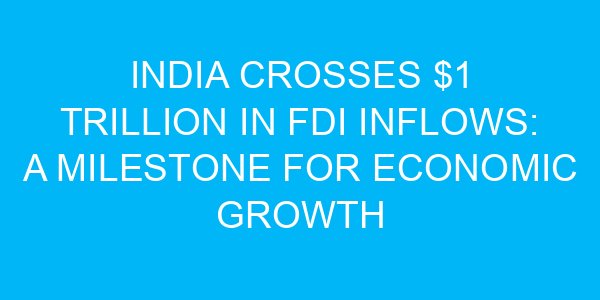Foreign Direct Investment (FDI) inflows into India have crossed the remarkable $1 trillion milestone, covering the period from April 2000 to September 2024. This achievement solidifies India’s position as a leading global investment destination, showcasing its robust economy and favorable business environment.
Let’s explore this milestone and its significance for India’s growth trajectory.
Key Highlights of India’s FDI Milestone
Cumulative FDI Inflows
- Total FDI: $1,033.40 billion (April 2000–September 2024).
- Components: Includes equity investments, reinvested earnings, and other capital flows.
Top Contributing Countries
- Mauritius: $177.18 billion (25% of total inflows).
- Singapore: $167.47 billion (24%).
- United States: $67.8 billion (10%).
- Other contributors: Netherlands (7%), Japan (6%), UK (5%), UAE (3%), and Germany, Cyprus, Cayman Islands (2% each).
Leading Sectors for FDI
The most attractive sectors for foreign investors include:
- Services
- Computer Software and Hardware
- Telecommunications
- Trading
- Construction Development
- Automobile
- Chemicals
- Pharmaceuticals
FDI Trends Over the Last Decade
Growth in FDI Inflows (2014-2024)
- Cumulative FDI since 2014: $667.4 billion.
- Growth: 119% increase compared to the preceding decade (2004–2014).
Manufacturing Sector Growth
- FDI in manufacturing (2014–2024): $165.1 billion, a 69% rise from $97.7 billion (2004–2014).
Government Policies Driving FDI Growth
Ease of Investment
- Automatic Route: Allows FDI in most sectors without prior government approval.
- Approval Route: Required for sectors like telecom, media, insurance, and pharmaceuticals.
Prohibited Sectors
FDI remains prohibited in:
- Lottery, gambling, and betting.
- Chit funds and Nidhi companies.
- Tobacco product manufacturing.
- Real estate business (except construction development).
Reform-Oriented Approach
The government continuously reviews FDI policies and collaborates with stakeholders to make India more investment-friendly. Recent reforms include:
- Production-Linked Incentive (PLI) schemes to boost domestic manufacturing.
- Enhanced ease of doing business initiatives.
Future Prospects for FDI in India
Experts believe that India will remain a favored investment hub due to several factors:
- Resilient Economy: Healthy macroeconomic indicators and better industrial output.
- Geopolitical Dynamics: Shift in global supply chains favoring India.
- Sectoral Growth: Renewed private equity financing in tech, infrastructure, and digital ecosystems.
Expert Opinions
- Avimukt Dar, INDUSLAW: “Robust FDI inflows are anticipated, especially in tech and private equity financing.”
- Rumki Majumdar, Deloitte India: “Focus on infrastructure, skilling, and digital innovation will keep India attractive.”
- Manav Nagaraj, Shardul Amarchand Mangaldas: “India will see FDI growth across early-stage investments, growth capital, and strategic investments.”
Significance of FDI for India’s Growth
- Economic Boost: FDI strengthens industrial growth, infrastructure development, and job creation.
- Balance of Payments: Healthy inflows help stabilize the rupee and manage external trade balances.
- Technology Transfer: Encourages innovation through partnerships with global companies.
Key Takeaways for Competitive Exam Aspirants
- Current Affairs: Understanding FDI trends is essential for exams like UPSC, SSC, and banking exams.
- Economy and Policy: Insights into India’s investment climate can enrich essays and interviews.
- Sectoral Analysis: Detailed knowledge of key FDI sectors strengthens your grasp of India’s economic priorities.
India’s achievement of $1 trillion in FDI inflows is a testament to its economic resilience and investor-friendly policies. As the nation gears up for a promising future, understanding this milestone is crucial for anyone preparing for competitive exams or tracking India’s economic growth.



